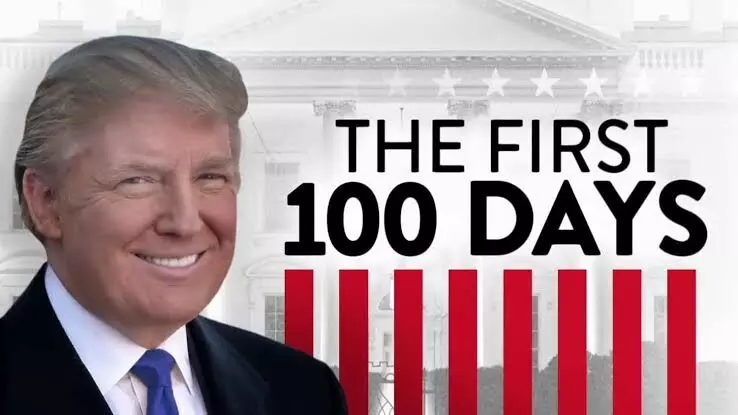MAGA or Mirage? The Global Costs of Trump’s First 100 Days

Images Credit - MSNBC NEWS
The first hundred days of any presidency are symbolic, setting the tone for what’s to come. In the case of Donald J. Trump, they were not only symbolic—they were seismic. Branded by his fervent commitment to "Make America Great Again," Trump’s early days in the Oval Office unfolded like a breakneck demolition of past global partnerships, treaties, and norms. Supporters saw a fearless disruption of the status quo. Critics saw a dangerous unraveling of decades-long international leadership.
One of the most jarring shifts was in America's long-standing legacy of global philanthropy and diplomacy. The United States, through institutions like USAID and the State Department, had for decades been the largest donor of humanitarian aid, global health funding, and biodiversity preservation. These efforts—spanning from eradicating polio in Nigeria to delivering emergency aid in Yemen—were not just altruistic gestures; they were investments in global stability that paid geopolitical dividends. But Trump’s budget proposals slashed foreign aid by over 30%, sending a clear message: if it doesn’t serve a direct economic or military interest, it’s not worth funding.
This approach resonated with a segment of the American electorate disillusioned by global entanglements. Yet it deeply rattled allies. The administration's rhetoric and actions—whether it was threatening NATO members over financial contributions or pulling out of UNESCO and the Paris Climate Agreement—conveyed a transactional, inward-looking America. Where past administrations saw value in soft power, Trump viewed it as weakness. The ripple effects were swift. Europe began talking more seriously about strategic autonomy. Global climate coalitions looked to China, not Washington, for leadership. America's geopolitical brand—built over seven decades—tarnished in months.
Perhaps nowhere was this shift more consequential than in conflict zones like Israel and Ukraine. In Israel, the Trump administration touted its decision to move the U.S. embassy to Jerusalem as a bold step forward. But the diplomatic infrastructure needed to shepherd both sides toward peace—already fragile—was gutted. Palestinian voices were effectively sidelined, and hardliners grew bolder, resulting in a further erosion of any peace process.
In Ukraine, Trump's ambivalence toward Russian aggression—exacerbated by his infamous 2018 Helsinki summit performance—created confusion within NATO. While military aid eventually reached Kyiv, the delayed and conditional nature of support gave Moscow enough psychological room to test red lines. The credibility of American deterrence faltered.
On the economic front, Trump’s "America First" doctrine ushered in a revival of economic nationalism—manifested through tariffs, trade renegotiations, and industrial favoritism. The logic was straightforward: protect American jobs and industries, especially in the Rust Belt. In practice, it sparked retaliatory trade wars, most notably with China. Tariffs on $360 billion worth of Chinese imports led to tit-for-tat measures that battered U.S. agriculture. According to a 2019 study by the Federal Reserve Bank of New York, American consumers and companies bore nearly the entire burden of those tariffs, not Chinese exporters. Furthermore, supply chain disruptions hit small manufacturers hard, undercutting the very constituencies Trump aimed to protect.
Then came the environmental retreat. Trump’s decision to pull the U.S. out of the Paris Climate Agreement was more than symbolic—it was strategic abdication. While other nations ramped up renewable energy investments, America rolled back regulations, opened federal lands to drilling, and muzzled scientific advisory panels. This not only damaged America’s standing in climate diplomacy but ceded economic leadership in the green energy race to countries like Germany and China. At a time when climate-related disasters cost the U.S. $95 billion in 2020 alone, undermining clean energy policy was both environmentally reckless and economically short-sighted.
From a geopolitical lens, the ramifications of Trump’s first 100 days stretched beyond policies—they reshaped perception. International institutions, once anchored by American support, began to drift. The World Health Organization faced a U.S. withdrawal during a global pandemic. The United Nations was repeatedly dismissed as ineffective. Even the G7, a club of America’s closest allies, became a stage for discord. The result was a strategic vacuum increasingly filled by authoritarian states. China expanded its Belt and Road Initiative; Russia deepened ties in Africa and the Middle East; even Turkey began posturing independently in NATO arenas.
Supporters argue that Trump disrupted a stale consensus and recalibrated international relations toward more direct national interest. There is some truth to that. Trade deals like the USMCA (which replaced NAFTA) did include stronger labor provisions. Pressuring NATO countries to spend more on defense did yield increased contributions. But the gains were piecemeal compared to the diplomatic capital spent and trust lost. According to the Pew Research Center, global confidence in the U.S. presidency dropped to a historic low during Trump’s tenure, with just 17% of Germans and 19% of French expressing confidence in Trump’s leadership in 2020, compared to over 80% during Obama’s presidency.
In the final analysis, Trump’s first 100 days did not merely shake up Washington—they shook the world. The shift from liberal internationalism to aggressive unilateralism altered America's role on the global stage. For some, it marked a necessary course correction from what they saw as naïve globalism. For many others, it revealed a retreating superpower increasingly defined by contradiction: demanding loyalty from allies while questioning alliances, embracing sovereignty while intervening selectively, and promoting nationalism while trading at scale.
Whether these first 100 days were a prelude to renewal or decline depends on one’s ideological lens. But what’s clear is that they redefined America’s global posture in ways that will echo long after Trump. In an era of rising multipolarity, pandemics, and climate urgency, the world may not wait for America to find its footing again.
